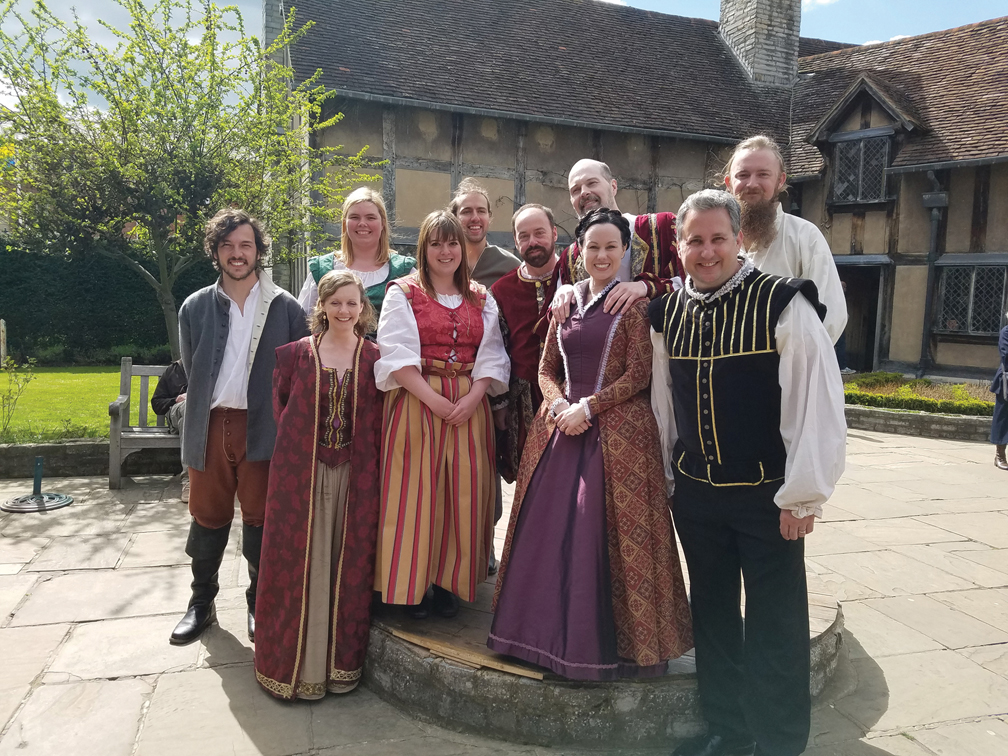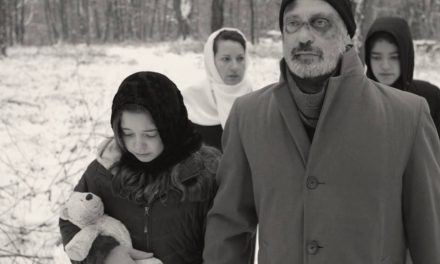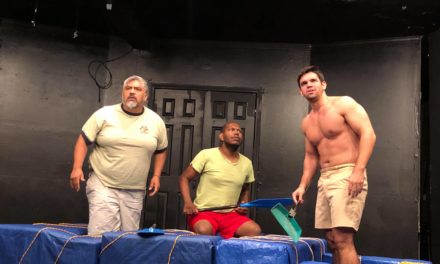Matt Wallace (far right, front) in Stratford-on-Avon as a part of the 400th anniversary celebrations of the birth of William Shakespeare. Also pictured are Kentucky Shakespeare company members Amy Attaway, Kyle Ware, Abigail & Gregory Maupin.
Photo courtesy of Kentucky Shakespeare.
Matt Wallace of Kentucky Shakespeare
Interview by Scott Dowd
Entire contents copyright © 2016 by Fearless Designs, All rights reserved.
April was a huge month for Bard-o-philes. April 23, 2016, marked the 400th anniversary of the beginning of Shakespeare’s legacy. The poet of Stratford-upon-Avon died on that date in 1616—the same date that in 1564 marked his entrance as a player on the world’s stage. Kentucky Shakespeare’s Producing Artistic Director Matt Wallace was filled with energy as he made his way through the hours between him and the anniversary celebration he planned to attend in Shakespeare’s hometown in Warwickshire, England, about 100 miles northwest of London. Perhaps as a distraction, Matt sat down with me to talk about the big event as well as his plans for the Kentucky Shakespeare Festival’s 2016 season.
Matt Wallace: This is an exciting and unexpected trip for us. I went over to Stratford-upon-Avon a couple of years ago through a fellowship with the Community Foundation of Louisville. I never dreamed that I would get to go back for the 400th Anniversary. We have a partnership with the Shakespeare Birthplace Trust—we welcomed them here a couple of times and I was over there studying with them—and this came out of that relationship. Last fall they invited us to be part of the historic legacy celebration. Three of our incredibly generous Stratford Society members offered to fund this trip.
Scott Dowd: Who is going with you?
MW: Amy Attaway, who directs for me in the summer; Kyle Ware, Director of Education; and Greg and Abigail Maupin, two remarkable members of our company.
SD: Where will you be for the actual day?
MW: We will be at Shakespeare’s New Place, which is the home he lived in on his return to Stratford-upon-Avon at the end of his life. After he made some money and became a success, he bought a large house there. It’s where he lived when he wrote a lot of his plays. Two years ago I worked on Macbeth while sitting in his garden—where he probably was when he wrote it. That was pretty surreal. We have been invited to study from the Shakespeare archives and attend some lectures in preparation for the Saturday morning festivities. On that morning we will be kicking off an hour-long show on BBC called Breakfast With The Bard. That starts the Shakespeare Lives online festival and a day of worldwide celebrations.
SD: What will you do to get things started?
MW: We will be presenting the “house blessing” scene from A Midsummer Night’s Dream (Greg Maupin will perform as a Shakespearesque character). All five of us will then be in the birthday parade that travels from his birthplace to where he is laid to rest at Holy Trinity Church. Later that day we will be performing in the birthplace gardens for the many tourists who are expected. We are working with the actors from the birthplace so that we can do some scenes with them and mix the casts. Finally, that night we perform at the Chairman’s Gala. We’ll be doing pop-up scenes in the gardens at New Place. That night, Prince Charles, David Tennant, Catherine Tate, Benedict Cumberbatch, Judi Dench, Ian McKellen, Helen Mirren, Meera Syal and many others will be at the Royal Shakespeare Company in London. We will watch the live stream from Queen Elizabeth Hall and then go down for fireworks over the Avon River. It will be an incredible day and we’re excited to represent Louisville and the United States. It’s a Shakespeare-lover’s dream.
SD: And what a way to get ready for a summer of Shakespeare in Central Park.
MW: The timing is perfect. We get back just in time to begin work on costumes and stage management. Rehearsals begin the next week. We are going to take all of this energy, inspiration and knowledge and put it into our fifty-sixth season.
SD: You will begin the season with what is often considered to be Shakespeare’s first play: Two Gentlemen of Verona.
MW: It is definitely an early work. You can tell that as a writer he was still figuring out things. I am directing this production, and it’s interesting when you break it down to see there are a lot of two- and three-person scenes. He hadn’t quite mastered large scenes. But it’s a really funny play, which hasn’t been performed on our stage since 1996. It is lesser known, so I think we are going to take some liberties with it.
SD: In what way?
MW: We will infuse it with a lot of music and dance. We are also setting it in a pre-1920s period. Our season is comprised of three of Shakespeare’s Italian plays. That element will be seen in the sets Paul Owen is designing. It’s going to be a lot of fun.
SD: How are you going to handle Crab, the dog?
MW: We’ve hired the dog who appeared in the recent Actors Theatre production of For Peter Pan on her 70th birthday. They referred us to this great dog named Hope from Hart County. She is a therapy dog who works with all kinds of different people. With all the squirrels, other dogs, sirens and other distractions in park, we needed an even-keeled dog. Hope is going to steal the show.
SD: She probably has the biggest nonspeaking role in Shakespeare!
SD: Why that time period?
MW: The first reason was the music. The song “My Buddy” is about the country after World War I, where all these strong male relationships were formed. The play features a friendship between Valentine and Proteus, and I needed a backdrop that would help to tell that story. When I was at the Royal Shakespeare Company a couple of years ago, I was inspired by the ways they incorporated live music, sung by the actors, into the production. So we are exploring that. Greg Maupin, who is also our dramaturg, has been working with me for months to find the right songs from the period. Actors will play instruments, too.
SD: Of course, you have Scott Joplin and the beginning of ragtime right there.
MW: Yes! And we will be incorporating the Victrolas! We will have people singing with the Victrola as well as a live piano player on stage to help tell the story.
SD: Are there still a lot of purists? People have been working with Shakespeare in new ways to keep it fresh, so Elizabethan garb would almost be the exception.
MW: They’re still there. In the past, we have gotten letters every time it wasn’t set in hose and doublet. I don’t think they will mind so much because this play isn’t well-known. I’m not going to please everybody. Certain critics will say, “Oh, he’s just doing another traditional production.” Other people will ask, “Why doesn’t he do something different?”
SD: Winter’s Tale has a lot of the same elements as Two Gentlemen of Verona— with its quick turns of affection.
MW: Winter’s Tale is a well-kept secret of the repertoire. It’s a great follow-up to last season’s The Tempest. We will go from one of the early plays to one of Shakespeare’s last plays. It’s full of beautiful language, great stories and a magical element. Amy Attaway is embracing that fairy tale idea in this production. I directed this play at Shakespeare Behind Bars a few years ago, and I love the ideas of redemption and forgiveness, not to mention the absurdity. We’re doing theatre, so let’s go for it! Let’s have statues come to life and bears chase people off stage!
SD: And you plan to finish the season with one of the best-known works in all of Shakespeare.
MW: I’m balancing it against the other two—it’s kind of our Christmas Carol of the season. But I didn’t want to do just another Romeo and Juliet. In this day and age, how do we tell the story of these lovers? I’m really excited about the diversity we are bringing to the stage this year. Nearly half of our ensemble are actors of color. In the other two shows, we’ll be exploring mixed casting and, in Romeo and Juliet, the families will be of different skin color. It is set in the Italian Renaissance with some contemporary twists.
SD: So people are going to understand the conflict in a more visceral way than they might watching two European families.
MW: There have been productions in the past that have explored race, but not many have gone all the way with it. The last two seasons I’ve really tried to have greater diversity in the cast. I am excited for audiences to see how this impacts not only Romeo and Juliet, but the other two shows as well. We serve one of the most diverse audiences in the region, and I want to make sure that is reflected on the stage.
SD: You have also been expanding the “festival” aspect of the season. How long is your season this year?
MW: Eleven weeks—the longest we’ve ever had! We will have two weeks of rotating rep so that people can see all three of our productions. Then we’ll do the Bard-a-thon—all three productions back to back. After that, we close the professional season for a week of As You Like It performed by our students. CenterStage then brings West Side Story to the amphitheater for a full week, followed by our newest addition—a week of Louisville Ballet called Shakespeare in Dance! I’m really excited about the addition of the Louisville Ballet. They will be performing Roger Creel’s piece Sonnets in Blue, which premiered a couple of years ago at Louisville Ballet’s Choreographer’s Showcase. It incorporates live bluegrass music, a couple of our actors and ten dancers. The other half will include some famous ballet pieces from Shakespeare.
SD: This is an exciting expansion because it really speaks to what the Kentucky Shakespeare Festival can be.
MW: I was just looking at our final numbers in terms of who we are employing this summer: sixty-eight people and one dog. Ninety-six percent of those people live right here in the area. During the year they work with Actors Theatre, StageOne, Walden Theatre, Blue Apple Players, Louisville Ballet, Kentucky Opera and Derby Dinner Playhouse. We are able to employee them and keep them living here in Louisville.
SD: How is your funding for the festival?
MW: We are mostly funded for this season, which is a really exciting place to be. I am already planning next season. We are also happy to be able to announce that we are going to do something different and spooky in October—a play we couldn’t do in the park. We’ve never produced it even though it was Shakespeare’s most popular…and bloodiest…play. Teaming up with Play Louisville, Titus Andronicus will be performed in a Butchertown warehouse and run three weeks around Halloween.
SD: Any plans for The Kentucky Center?
MW: We are working on that. We would really like to do another production in January. Right now we are looking for corporate and individual sponsors to allow us to do it again. If I could find $25,000 in sponsorship, that would be enough for us to go ahead with it.
SD: What show do you have in mind?
MW: I think I will hold off on the announcement for now, but we are looking at doing a Tony Award-winning piece inspired by Shakespeare. We are hopeful we will get the funding to do it.
SD: It sounds like a remarkable season. I’m really looking forward to great theatre!
MW: We will have that. But beyond the stage, we are looking at how we can remove the barriers and make the park and Shakespeare more accessible to everyone. This summer, in addition to everything else, we are adding open captioning and audio description. The lighting has been improved and renovations will be made soon to the rest rooms. This is going to be a great summer and I hope everyone will come find out what Kentucky Shakespeare Festival is all about.
The Shakespeare in the Park professional season opens June 1 and continues through August 14. Performances begin at 8 p.m. and seating is on a first-come basis. For information about Late Night Shakes and other community partner programs available this summer, go to KYShakespeare.com. All performances are free of charge, but a free will gift keeps Will free! The Stratford Society was co-founded by Gordon Strauss several years ago. Those who make a gift of $1,564 or more will receive invitations to special events throughout the year, including the opening reception, rehearsals and other events that give a peak behind the curtain. For more information, contact Kentucky Shakespeare Festival at 502.574.9900.
Scott Dowd has a wealth of experience working within and commenting upon the arts scene in Louisville. He has been involved with Kentucky Opera, the Louisville Orchestra, and Louisville Public Media. His talents and experience include: Actor; Director; Singer; Musician; Radio and Television Interviewer; Classical and News Jock; Public Speaking; Public Relations; Marketing; Development; Writer; Substantive Editor. He currently serves on the Board for Arts-Louisville.com.





